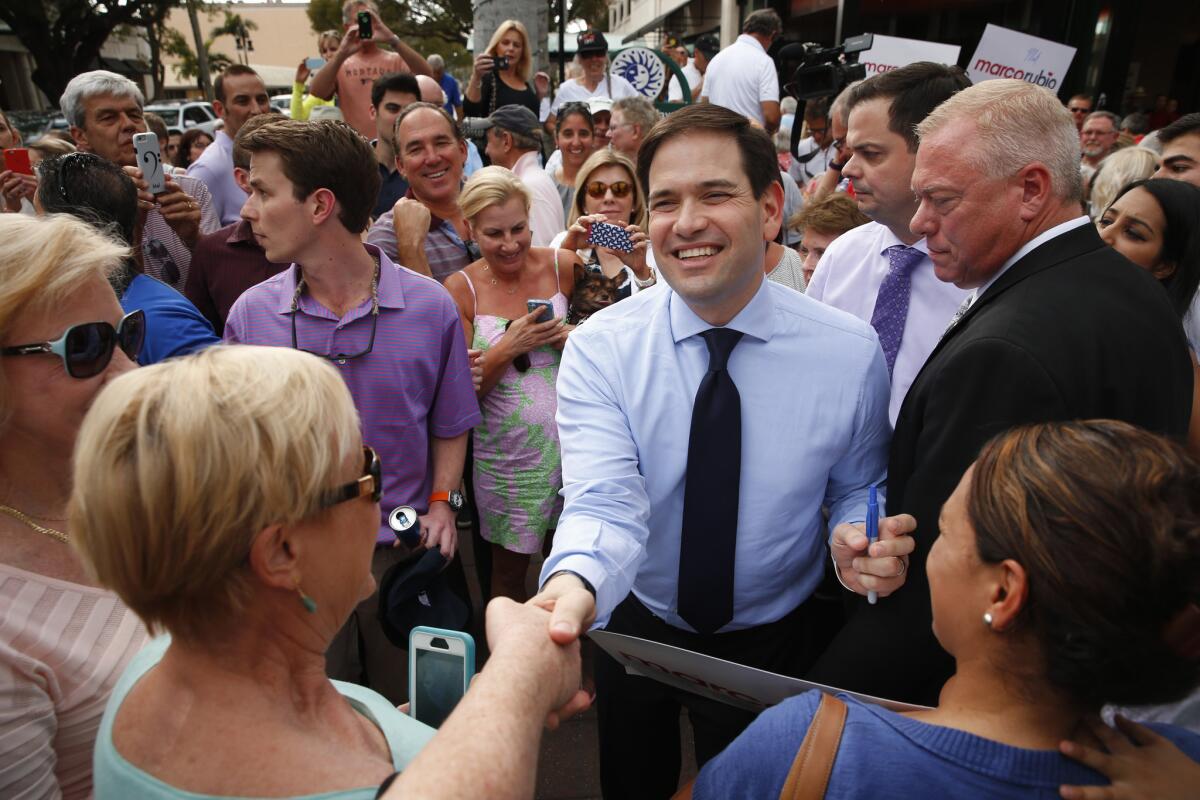In Miami, Marco Rubio’s foibles are seen as South Florida’s foibles

Sen. Marco Rubio of Florida, pushing to win his home state in the Republican presidential contest, greets supporters in Naples on Friday.
When the rest of the country mocked Marco Rubio for his designer black leather boots, the ones that make him look a few inches taller, people in Rubio’s hometown shrugged.
Who around here doesn’t spend a little money — OK a lot — to enhance this or that?
Election 2016 | Live coverage on Trail Guide | March 8 election results | Track the delegate race | Sign up for the newsletter
And news stories about his cocaine-dealing brother-in-law? Sure, there were ethical questions about Rubio helping him get a real estate license upon his release from prison in 2002, when Rubio was part of the leadership of the state Legislature. But the cocaine part of the story wasn’t so shocking. The brother-in-law was convicted back in the high-rolling 1980s. In Miami, if it wasn’t a relative dealing coke, it was a neighbor, or a high school classmate.
Rubio, the first-term senator from Florida, may be on the verge of ending his bid for the Republican presidential nomination if he does not win his home state’s primary on Tuesday. And there are many reasons — most far weightier than his fancy boots — for his crash. But as the campaign enters what may be its twilight phase, many in South Florida have been struck by how differently Rubio’s traits, faults, and political sympathies have been viewed on the national stage than they are at home.
Miami’s reputation as an anything-goes town, one that takes pride in its bizarre crimes and carnival-like political culture, is well-earned. Things that grab attention on a national stage are often viewed with a jaundiced eye here.
“Miami’s very forgiving of poor decision making,” said Justin Wales, a local attorney and liberal political activist. “We built the city around it.”
Politics, and the belief that a good story to tell can smooth over any old indiscretions or bouts with corruption, fits well into that.
Nearly all of the allegations thrown at Rubio — accusations of house-flipping, using the Republican Party credit card for lavish vacations, keeping close ties to a controversial politician — have been covered extensively by the local media. And residents have certainly raised questions and taken notice.
But Rubio’s alleged foibles, some of which he denies and others which he says are overblown, don’t hold a candle to the stuff that becomes lore around here — the U.S. attorney who resigned after being accused of biting a stripper in the 1990s; the one-time county commissioner who fled to Australia a few years later to avoid questions about a prostitute, a crack den and his stolen Mercedes; the former city official under investigation for corruption who shot himself in the Miami Herald’s lobby.
Even the ecology here is a little different.
“You can wake up on any given morning and find an alligator in your swimming pool,” said Jose Dante Parra, a Miami native who covered the city as a journalist before a career in national Democratic politics in Washington. “It desensitizes us a little bit.”
“The flip side of that is that other places might be so boring,” he added. “Just one story like the ones we have here in Miami would be remembered for a long time” if it happened in most other cities.
Politicians depend on those short memories, the fact that so many people here are tourists or move in or out from elsewhere.
Another criticism Rubio has weathered on the campaign, that he has altered his talking points when he speaks with Spanish-language media, is a well-worn tactic here.
Alex Villalobos, a Republican former majority leader in the Florida Senate who has not endorsed in the presidential race, said South Florida lawmakers routinely leave the House or Senate floor midway through a debate to call the local Spanish-language radio station back home to claim credit for a bill they never passed or money that someone else secured.
“Within minutes, what I saw before my very eyes morphed into something else that never happened,” said Villalobos, now a lawyer-lobbyist. “The person who actually did it is still on the floor, and you’re on the phone to take credit for it. You’re on the phone to live radio.”
This city has long been populated by people who have come from all corners — New Yorkers, Latin Americans of all nationalities, Haitians, Jamaicans — to write their own narrative and create their own myths. Rubio did that, too, claiming for years that his parents were Cuban exiles fleeing Fidel Castro’s regime, when in fact they came as immigrants before Castro took power.
Michael Colon, who was unwrapping colorful artworks by the popular local Brazilian artist Romero Britto at his mall kiosk on a recent afternoon, forgave that transgression as well.
“People migrate for different reasons,” the 33-year-old said.
Joe Cardona, a local filmmaker who was born in Puerto Rico to Cuban parents, said the city’s cultural mix has given residents their own cultural identity, so that he identifies more as a Miamian than as a Cuban American.
“We all grew up in this quirky place,” Cardona said. “We’re all a little Latino down here, and we’re all a little Jewish down here, and we’re all a little Haitian. It’s inevitable.”
Looking around the Dolphin Mall, where Colon’s kiosk is located, it’s easy to see that mix. The breezy collection of designer outlet stores and themed restaurants is filled with tourists and residents from around the hemisphere, all eating dinner, drinking mojitos, or pushing carts full of shopping bags.
It’s typical Miami and gives a far different context to the fights over immigration than Rubio hears on the Republican debate stage or on the campaign trail in Iowa or South Carolina. That may be the most difficult issue of all for Rubio to navigate.
Colon — who said his own parents fled Cuba in 1968, nearly a decade after Castro took power — said he was far more concerned with Rubio’s inconsistencies on immigration policy than his family story.
Colon, a Republican, wants the kind of immigration overhaul that Rubio once fought for but later abandoned as it became unpopular with Republicans elsewhere.
“Where does he stand?” Colon asked.
For more on Campaign 2016, follow @NoahBierman
ALSO
For Trump, protests create a short-term benefit and a long-term threat
Trump says he’ll consider paying legal fees for supporter who punched a protester
Clinton has big lead in Florida, but close race in Illinois, polls show
More to Read
Get the L.A. Times Politics newsletter
Deeply reported insights into legislation, politics and policy from Sacramento, Washington and beyond. In your inbox three times per week.
You may occasionally receive promotional content from the Los Angeles Times.











